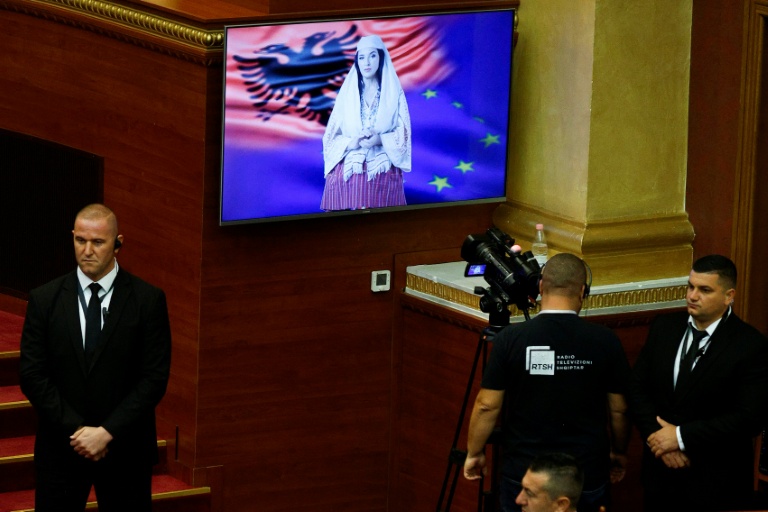Science
Albania Appoints AI Minister to Combat Corruption, Faces Scrutiny

Albania has made headlines globally by appointing an AI-generated minister named Diella to oversee its public tenders portfolio. The announcement was made by Prime Minister Edi Rama, who claims that this unprecedented step will eradicate corruption in government contracts—a significant barrier to Albania’s aspirations for European Union membership. Despite the ambitious promises, experts are raising serious concerns about the implications of relying on artificial intelligence for public governance.
In his announcement, Rama asserted that Diella would ensure that public tenders are “100 percent free of corruption.” He emphasized that Diella, unlike human officials, “never sleeps, she doesn’t need to be paid, she has no personal interests.” This statement comes against the backdrop of Albania’s reputation for corruption, with the country ranking 80th out of 180 in the Transparency International corruption index. Numerous politicians, including former mayor of Tirana and former Prime Minister Sali Berisha, have faced accusations related to corrupt practices involving public funds.
While the appointment is touted as a breakthrough, experts argue that the effectiveness of Diella is questionable. Erjon Curraj, a digital transformation and cybersecurity expert, noted that the success of any AI system is contingent upon the quality of data used to train it. Diella likely operates on Large Language Models (LLMs), similar to those used by popular chatbots. Curraj warned that if the data fed into Diella is biased or flawed, it might result in erroneous decisions, including misinterpretations of documents or failure to detect collusion among suppliers.
Further complicating the situation, Jean-Gabriel Ganascia, a computer scientist and AI specialist, pointed out that LLMs inherently reflect societal biases. He stressed that the assumption that a machine is free from bias could lead society to relinquish control over critical decision-making processes. Ganascia cautioned against the notion of a machine providing “the right answer” without the possibility of human deliberation.
The opposition has voiced significant concerns regarding accountability in the face of this technological shift. Berisha has raised the question, “Who will control Diella?” echoing sentiments expressed by Ganascia about the potential loss of accountability when machines assume roles traditionally held by human officials. Ganascia emphasized that a politician can be held responsible for decisions, whereas a machine’s actions might evade scrutiny, leading to a dangerous reliance on technology devoid of human oversight.
In an effort to address these fears, a decree released on Thursday clarified that Prime Minister Rama would retain responsibility for the establishment and functioning of the virtual Ministry of Artificial Intelligence Diella. Nevertheless, the broader implications of such governance remain unclear.
Rama has garnered attention for his unorthodox governance style and controversial initiatives, which include bans on platforms like TikTok and the creation of a Bektashi State modeled after the Vatican. While these moves have attracted international interest, their effectiveness has often been questioned. For instance, TikTok remains accessible in Albania, and legal challenges are ongoing concerning the migrant camps intended to house individuals intercepted at sea by the Italian government.
The appointment of Diella, whose likeness is based on Anila Bisha, a prominent Albanian actress, raises further concerns about compliance with EU standards. As Albania aims to join the European Union within the next five years, there is little transparency regarding how Diella operates. Political scientist Lutfi Dervishi remarked that if a corrupt system supplies manipulated data, Diella could merely perpetuate old corruption under a new guise.
As Albania navigates this uncharted territory, the effectiveness and ethical implications of AI in public governance will be closely scrutinized. The future of Diella, along with the integrity of Albania’s political landscape, remains uncertain as the Constitutional Court prepares to review the legality of this pioneering appointment.
-

 Politics4 weeks ago
Politics4 weeks agoSecwepemc First Nation Seeks Aboriginal Title Over Kamloops Area
-

 World5 months ago
World5 months agoScientists Unearth Ancient Antarctic Ice to Unlock Climate Secrets
-

 Entertainment5 months ago
Entertainment5 months agoTrump and McCormick to Announce $70 Billion Energy Investments
-

 Science5 months ago
Science5 months agoFour Astronauts Return to Earth After International Space Station Mission
-

 Lifestyle5 months ago
Lifestyle5 months agoTransLink Launches Food Truck Program to Boost Revenue in Vancouver
-

 Technology3 months ago
Technology3 months agoApple Notes Enhances Functionality with Markdown Support in macOS 26
-

 Lifestyle3 months ago
Lifestyle3 months agoManitoba’s Burger Champion Shines Again Amid Dining Innovations
-

 Top Stories2 months ago
Top Stories2 months agoUrgent Update: Fatal Crash on Highway 99 Claims Life of Pitt Meadows Man
-

 Politics4 months ago
Politics4 months agoUkrainian Tennis Star Elina Svitolina Faces Death Threats Online
-

 Sports5 months ago
Sports5 months agoSearch Underway for Missing Hunter Amid Hokkaido Bear Emergency
-

 Politics5 months ago
Politics5 months agoCarney Engages First Nations Leaders at Development Law Summit
-

 Technology5 months ago
Technology5 months agoFrosthaven Launches Early Access on July 31, 2025





















